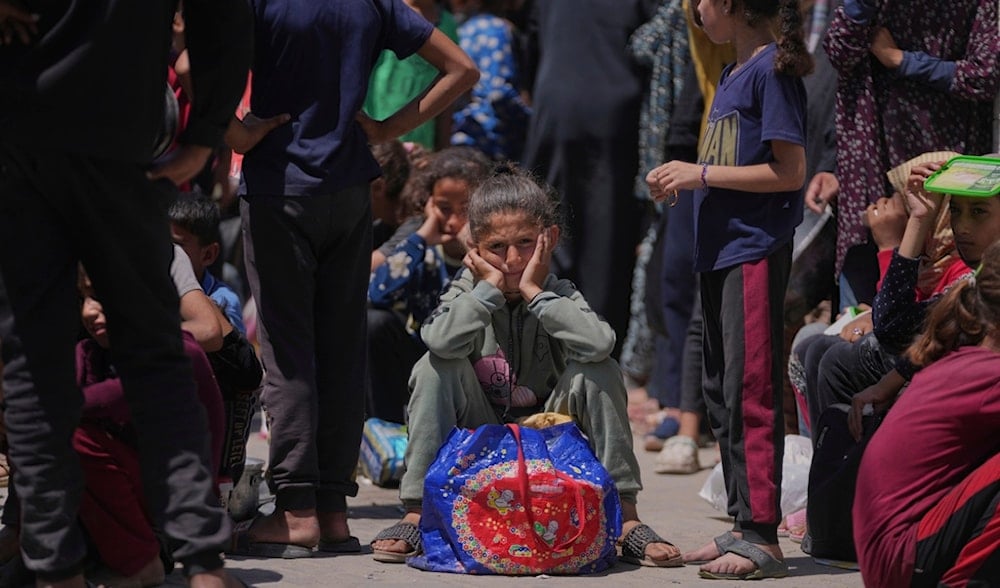'Israel' enforcing starvation in Gaza amid aid blockade, UN warns
The UN warns of forced starvation in Gaza as "Israel" blocks critical humanitarian aid. Top UN officials raise concerns of war crimes and call for international action.
-

A Palestinian girl waits to collect donated food at a food distribution kitchen in Deir al-Balah, Gaza Strip, Friday, May 30, 2025 (AP)
The United Nations Office for the Coordination of Humanitarian Affairs (OCHA) has stated that "Israel" is blocking nearly all humanitarian aid into Gaza, leaving the population with minimal access to food and essential supplies.
OCHA spokesperson Jens Laerke described Gaza as "the hungriest place on earth," warning that 100% of the population is now at risk of famine.
Laerke noted that while 600 of 900 aid trucks were authorized to reach the border, most have been held back by bureaucratic and security hurdles, preventing effective delivery. "What we have been able to bring in is flour," he said. "That's not ready to eat, right? It needs to be cooked..."
Blocked aid and bureaucratic hurdles
The blockade, which has been renewed following the collapse of the ceasefire in March, was only partially lifted last week. During the blockade, deliveries of food, medicine, fuel, and shelter were fully halted. However, the "lift" has allowed negligible aid compared to the humanitarian crisis Gaza has been enduring at the hands of the occupation.
The International Committee of the Red Cross and Red Crescent confirmed that half of its medical facilities in Gaza are non-operational due to a lack of fuel and medical equipment.
Consequently, Tom Fletcher, the UN's humanitarian chief, told the BBC that the situation in Gaza amounts to forced starvation, a practice considered a war crime under international law. "Yeah, it is. It is classified as a war crime," he stated. While acknowledging that judicial bodies and history will make the final judgment, Fletcher emphasized the gravity of the current crisis.
Red Cross reports collapse of medical facilities
Tommaso della Longa, a spokesperson for the Red Cross, also highlighted the dire situation in medical infrastructure, indicating that humanitarian support is nearly impossible to deliver effectively.
Meanwhile, Fletcher urged Israeli Prime Minister Benjamin Netanyahu to disavow comments made by Finance Minister Bezalel Smotrich, who suggested that Palestinians should be left in despair and consider relocation. "This language, and ultimately, this policy... of forced displacement, isn't enacted," Fletcher said.
He added that aid is being intentionally withheld to pressure the population. "We're seeing food set on the borders and not being allowed in when there is a population on the other side that is starving," he said.
Global leaders condemn 'Israel's' actions
Growing international criticism has followed "Israel's" military operations. EU’s top diplomat Kaja Kallas remarked, "Israeli strikes in Gaza go beyond what is necessary to fight Hamas." German Chancellor Friedrich Merz said he "no longer understands" "Israel's" objectives.
The UK, France, and Canada have urged the cessation of military operations and the immediate entry of humanitarian aid.
Fletcher: 'Act now to prevent genocide'
On May 14, Fletcher warned the UN Security Council to act to prevent genocide in Gaza, citing reports of starvation, forced displacement, and mass casualties.
"In Rwanda, Srebrenica, and Sri Lanka, the world said afterwards we didn’t act in time. That’s my call to the Security Council and the world right now: will you act to prevent genocide?" Fletcher said.
What is the objective?
Following the easing of the blockade, chaos erupted at aid distribution centers run by the Gaza Humanitarian Foundation, a US- and Israeli-backed group. The UN, which refused to collaborate with the GHF, reported 47 injuries during recent aid distributions, when Israeli soldiers fired "warning shots" at Palestinians waiting to receive aid. The Gaza Health Ministry reported one Palestinian martyr and 48 injuries in the attack.
جيش الاحتلال يطلق قنابل غاز على المواطنين خلال توجههم لاستلام مساعدات الشركة الأمريكية في نيتساريم وسط قطاع غزة pic.twitter.com/6uYDOm9x9n
— شبكة فلسطين للحوار (@paldf) May 29, 2025
"Israel" resumed its onslaught two weeks after ending a ceasefire, citing pressure to free the remaining 58 captives. Fletcher emphasized that he supports the release of captives but warned that the current campaign exceeds that objective.
"I don't know now what the aim of this war is anymore. There’s a lot of talk about finishing off Hamas," he said. "Clearly, there can't be a part for Hamas in the new governance of Gaza and the Palestinian territories."
A broader humanitarian breakdown
Fletcher rejected claims by "Israel" that Hamas was diverting food aid, stating, "It's in our interest to stop that aid getting to Hamas and ensure it gets to civilians."
He called for negotiation and mediation to resolve the crisis and reiterated the need to allow humanitarian aid into Gaza to prevent further loss of life.
Fletcher, who is also responding to crises in Ukraine, Sudan, and Syria, warned of a worsening global context, cautioning, "The Security Council is polarized, divided... it's getting harder and harder to end wars, and we humanitarians deal with the consequences."
Read more: 'Israel's' Gaza aid model is 'distraction from atrocities': UNRWA

 5 Min Read
5 Min Read










